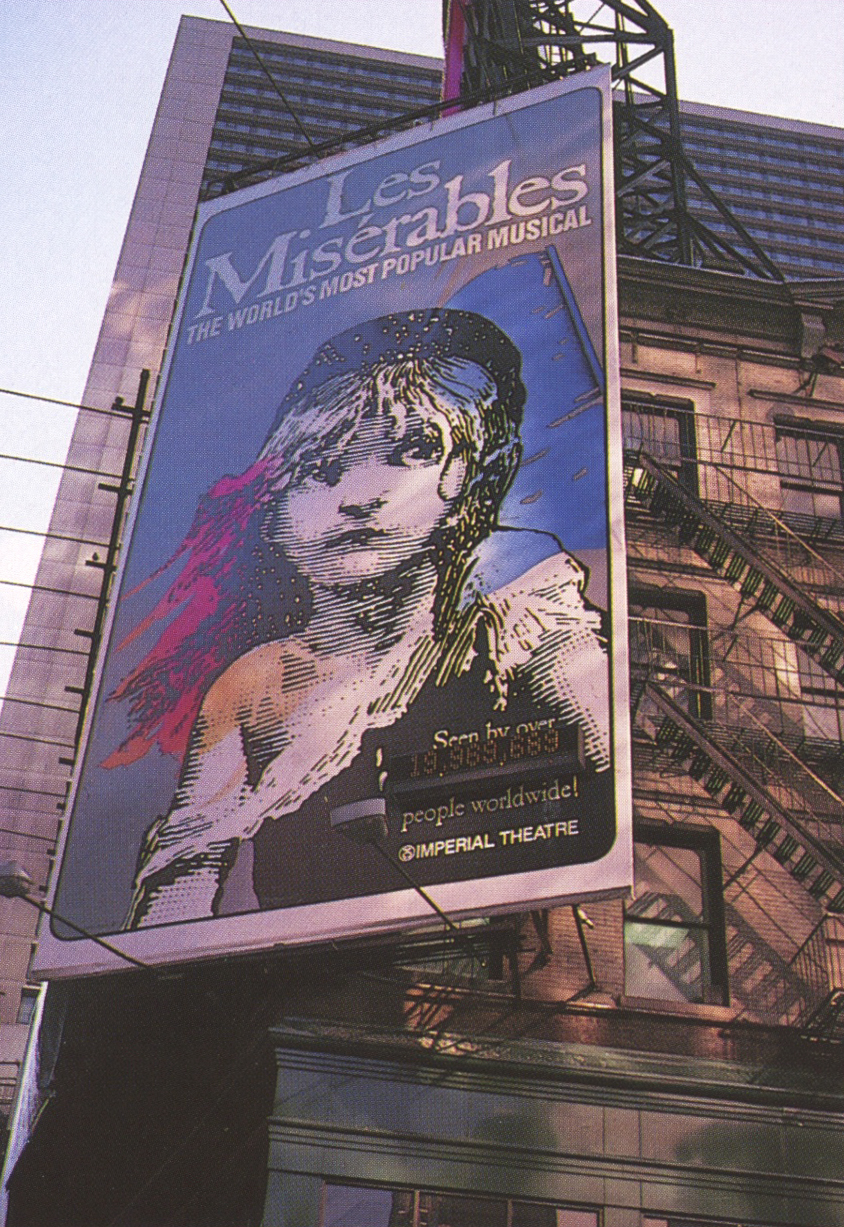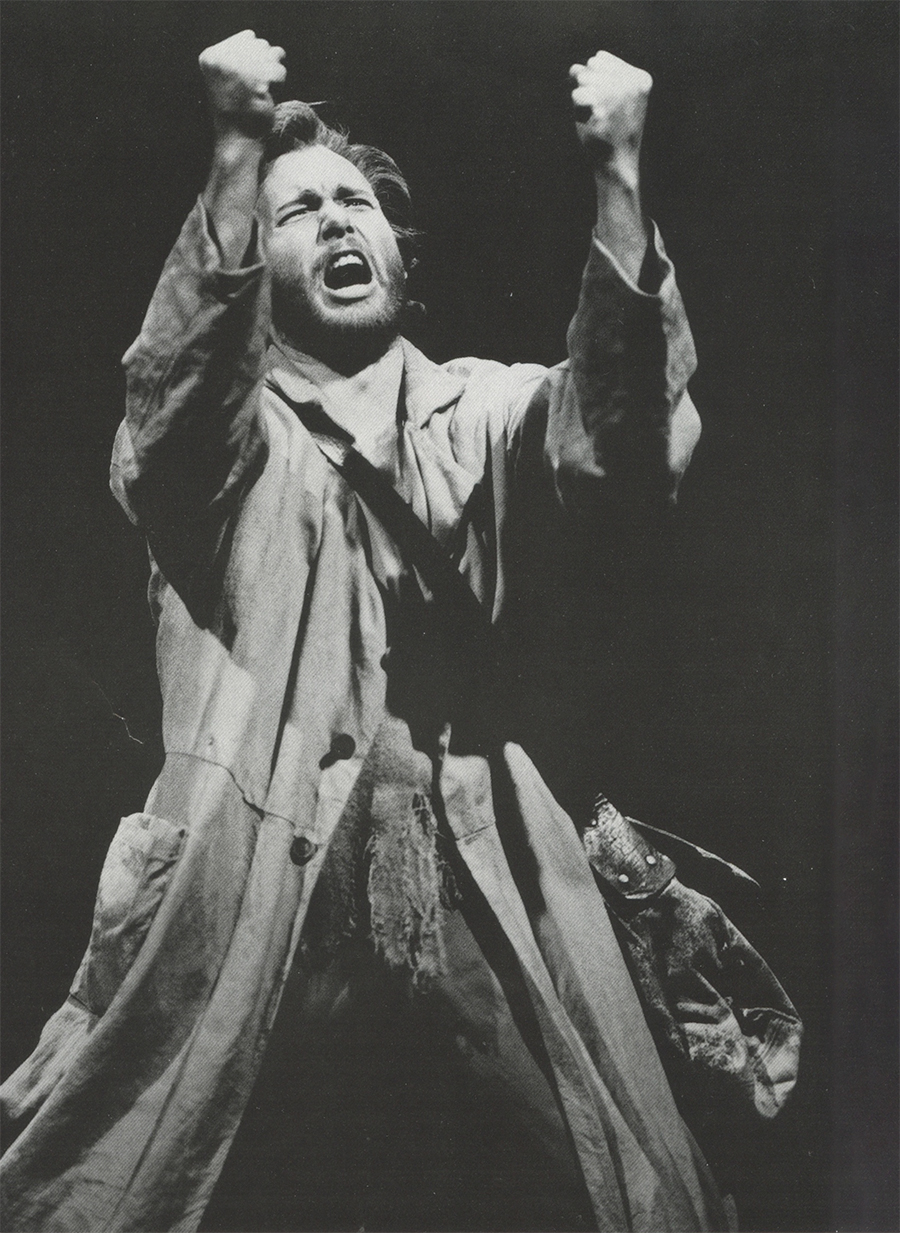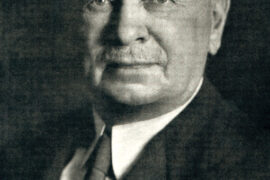A Huntington native finds fame and critical acclaim on Broadway. The story of a rising star in New York
By Kelly L. Cline
HQ 9 | AUTUMN 1991
Larger than life, a neon billboard on the corner of 47th Street and Broadway in New York City reads: “Les Miserables: The World’s Most Popular Musical.” On a brisk September afternoon, The Imperial Theatre, home to the well-loved Broadway musical adaptation of Victor Hugo’s famous novel, is alive with the bustle of matinee theatre-goers. Inside, melodic strains emanate from the pit beneath the stage as the orchestra tunes its instruments to perfection in anticipation of the opening curtain.
Ushers shuffle up and down the narrow aisles seating late arrivals just before showtime.
Backstage, Huntington native J. Mark McVey prepares himself mentally for the compelling performance he is about to give, a process which he maintains is indescribably draining.
The constant murmur of the crowd falls suddenly silent as the curtain rises and the spectacle begins.
McVey, who portrays the lead character of Jean Valjean, transforms himself into the role for which he has gained critical acclaim. Throughout the span of the 3-hour and 15-minute musical, Mc Vey sings 200 pages of music, walks and runs nearly a mile on a sloped stage (which often rotates mechanically to represent the passage of time), and ages flawlessly from a young paroled convict to a saintly old man, all the while achieving a near-perfect amount of dramatic composure and believability.
As the story unfolds, Val jean is released after 19 years on the chain gang for stealing a loaf of bread to feed a child, only to be condemned as an outcast by an unjust society. Set against the backdrop of the revolutionary 183 2 student uprising and barricade in Paris, “Les Miz” chronicles Valjean’s trials and tribulations thereafter.
McVey’s Valjean, according to critics, is perhaps the best ever portrayed on the American stage. His voice is described as “melted gold” displaying “flawless diction” with a “bell-like purity.”
Since every line in the play is sung, each time Mc Vey utters a note, the audience seems entranced by his talent. How did Mc Vey develop such a uniquely inspired voice? He credits his innate capability to growing up in the confines of a very musically-spirited family in Huntington. McVey contends that he learned about his singing voice very early in life.
“I started this play-acting bit really young,” he chuckles in remembrance. “Kindergarten couldn’t start until I stood up on my chair and sang ‘The West Virginia Hills.’ That’s just the way it was. That was the way every day began.”
He also kept his musical skills crisp at the First United Methodist Church, where he sang in the choir and participated in numerous dramatic productions over the years.
McVey graduated from Huntington High School and went on to Marshall University where he earned a marketing degree.
“I wanted to major in music because that was my first love. But I thought better of it, and my father helped me make the decision to get a good, solid business background in case something didn’t work out for me professionally.”
While attending Marshall, McVey performed in the University Theatre as well as with the Community Players, the Huntington Galleries, and the Mountaineer Dinner Theatre. Not limiting himself to musical expression through theatrical works alone, however, he also dabbled in rock ‘n’ roll music for a brief stint, singing with a group called BBC – The Brickyard Boogie Company.
Even though Huntington afforded Mark with an array of outlets for expression of his talents, he yearned to build a professional career in the performing arts. After giving his business degree a chance by selling security systems and burglar alarms in Florida, McVey ventured to the Big Apple, a city not totally unfamiliar to him. Mark’s sister Beth had lived in Manhattan for a number of years, and was already established there as a Broadway performer. She had convinced Mark to give show business a crack four years earlier when he was fresh out of high school at the age of 18. He started out modeling but opted to return to Huntington to pursue his college degree after confronting the harsh realities of big city life.

“The first time I got here, the hair designers and clothes designers wanted to change my entire image. So I had already been introduced to the city and how it was going to be – people trying to change your life automatically.
“I didn’t come up here the second time all starry-eyed and gazing at the lights. I knew basically what it was all about, and that it was going to be very difficult. It was a hard decision to make. I decided to finally do it because this is where I belong.”
One there, the harsh reality of living in the city crept up on McVey, even though he assumed he was well-prepared to handle anything that came his way.
“It really hits you in the face when you see that you only have $3 00 in your pocket and you have to pay the rent. It was hand to mouth – making your bills, making your rent, feeding yourself.”
Since he was forced to play the waiting game with regard to any professional jobs, McVey began waiting tables and bartending at night at Eastside establishments, which afforded him the opportunity to audition during the day.
Nearly a year later, the pavement well-pounded, McVey landed his first professional role outside the New York area in Darien, Connecticut, doing “Kismet.” Exposure from that performance led to a spot on the national tour of the musical “Carousel” based out of the Kennedy Center in Washington, D.C., where he played opposite Tom Wopat of “Dukes of Hazzard” fame.
The show was scheduled to open in New York, but the producers felt that Wopat’s singing voice wasn’t strong enough for eight shows a week, and the project was canceled.
“This is not what you would call a secure or steady profession. You go from one opportunity to the next, and if you’re fortunate enough to go from one job right to another, you’re very, very lucky. I’d say that 96 percent of the people in show business are out of work. You really count your blessings when you’re working – especially in this city.”
Shortly thereafter, McVey was introduced to “Les Miserables” and the character of Jean Val jean, a part which many feel he was made for. He gained a role in the highly successful first national company of “Les Miz,” where he began as an understudy to the lead actor. Ironically, now on Broadway, McVey’s Valjean has four understudies beneath him.
The company toured such cities as Detroit, Baltimore, Philadelphia, and Washington over its two-year run before returning to the Big Apple and settling comfortably into the Imperial Theatre. McVey’s reviews, compiled from each of the cities in which the company performed, were phenomenally glowing. He was consistently listed as a standout among the cast members, and his performances were described as brilliant masterpieces. In fact, music director Larry Teevens in Detroit gave McVey the ultimate compliment when he declared he’d sung the perfect song. McVey’s second act showstopper “Bring Him Home,” which often leaves audiences with not a dry eye in the house, was the piece. Says Teevens of McVey: “He did it – the perfect song! Such control. It was amazing! Nothing could have improved it. I turned to my wife and said, ‘The perfect song. I could teach him nothing.’ In all my years looking for perfection between singer and song, I never thought I’d hear it. But McVey did it.”
• • •
The 6’3″ blue-eyed blond seems full of vigor and energy, his stride hurried as he walks the streets of Times Square.
Clad in faded black denim with a long beige trench coat and a pair of wellworn cowboy boots, McVey displays the confidence of a maverick, ready to take on the world. He has no trouble expressing himself, either on stage or off. One might wrongly perceive his assured nature and inner strength as cocky arrogance. However, his high regard for his own talents and abilities is often coupled with humbling remarks.
“I get my talent from God,” he asserts. “I believe that if He were not with me, I wouldn’t be here today. And I have things that prove it to me everyday – like walking the streets of New York City I must have someone looking over my shoulder, watching over me, and that helps me through the day.”
He is a very spiritual man with strong ties to his family. He speaks of his mother, his father, and his wife as the most important and influential people in his life.
“They are the people that I count on. And they are the people who will let me count on them. I’m nowhere without them.”
So it would seem that McVey has reached the pinnacle of success in his career. Yet, at 33, he maintains that his achievements with “Les Miz” are only the beginning.
“I’m at the beginning of my career. It’s been a long seven years and I’ve only had three or four jobs in that period -three years of which have been with ‘Les Miz.’ As far as making a good living and being comfortable in New York City, it’s only been recently that I can say that.”
As for the future, McVey has a number of challenges he hopes to meet.
“I see myself staying here on Broadway while I break into television and film. I’m currently taking acting and directing classes. I would also love to record.”

Musically, McVey says he admires vocalist Michael McDonald, formerly with the Doobie Brothers. As far as acting goes, McVey respects the work of Robert De Niro, Dustin Hoffman, Ed Harris, and Clint Eastwood.
With nine performances of “Les Miz” a week, McVey states that the stress level involved is nearly indescribable.
“This is the hardest role I’ve ever done and likely the hardest role I will ever do. I’ve had to curb my diet, I have to work out constantly to keep in shape, I have to spend certain times of the day meditating, times completely away from other people because it is very difficult emotionally, spiritually, mentally, physically – it’s very, very draining. Making sure that it’s fresh and crisp and that the story gets told every single time is hard.”
But when it’s all said and done, and the audience comes alive with a rousing standing ovation in appreciation of his performance, McVey says there is no feeling like it in the world.
“You can feel the energy, the electricity in the air. When you’re really hot, when everything is clicking, there is a dead silence. There is a dead silence that is so loud that you can’t help but hear it. It brings the hair up on the back of your neck. That’s why I do it.”
Although McVey wears stardom quite well, he never forgets where he came from, and, when he speaks of his hometown, one can tell that Huntington and its citizens hold a place deep in his heart.
“Huntington is a wonderful city that has a lot going for it. But what it really has going for it is the people. There are good people there, and the majority of them are honest. There’s a philosophy of ‘Let’s take care of our own,’ and you don’t get that up here.”
• • •
As the curtain closes and the theatre empties, those who have witnessed the afternoon performance of “Les Miz” can go away feeling that they have gained something valuable from the play. They’ve seen a true star come to life. And while Mc Vey removes his makeup in his small dressing room backstage, he can rest assured that his talent has shone brightly for all the world to see.





